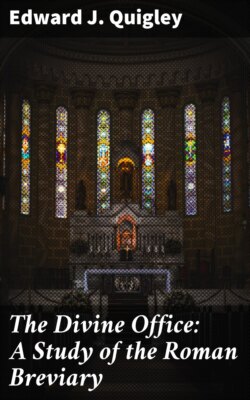Читать книгу The Divine Office: A Study of the Roman Breviary - Edward J. Quigley - Страница 5
На сайте Литреса книга снята с продажи.
PART II. RULES FROM MORAL AND ASCETIC THEOLOGY FOR THE RECITATION OF THE BREVIARY.
ОглавлениеWho are bound to say the office?
Must every holder of a benefice read the office?
What sin is committed by the omission of a notable part?
What sins are committed by the omission of the whole office?
What must a person do who has a doubt about omissions?
Does a person, who recites by mistake, an office other than that
prescribed fulfil his obligation?
What causes justify an inversion of the hours?
Is it a sin to say Matins of following day before finishing Compline
of the current day?
What is the time fixed for recitation of the Office?
When may a priest begin the recitation of Matins and Lauds for the
following day?
What is true time as regards recitation of the office?
Are priests bound to recite Matins and Lauds before Mass?
At what time should the little hours be said?
Where should the office be recited?
What kind of verbal pronunciation should be attended to?
May the recitation be interrupted?
May Matins be separated from Lauds without cause?
Is intention required in reading the hours?
Is attention required? external? internal? superficial attention,
literal attention?
Opinions of theologians on necessary attention.
Distractions, voluntary and involuntary.
Does a person reciting the hours sin, if he have distractions?
Causes excusing from reading the hours.
Scruples and the direction of the scrupulous.
